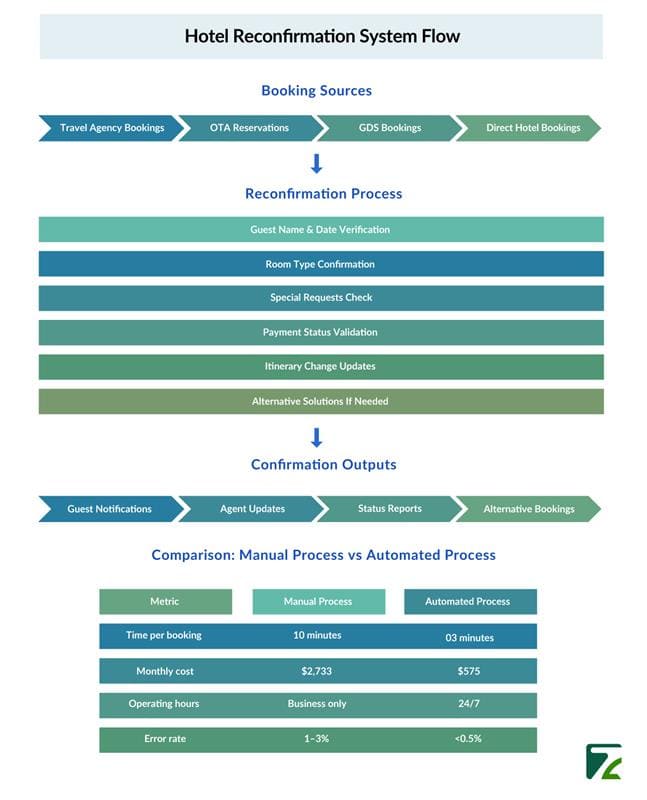Automated vs Manual Hotel Reconfirmation: Which is Better?
Reconfirmation of hotel booking is a major operating policy for travel agencies in 2025. With global cancellation rates reaching 40% on average due to booking errors or unmet expectations, the choice between automated and manual reconfirmation systems directly impacts client satisfaction, operational costs, and competitive positioning.
With upwards of 80% of hospitality providers using technology to optimize processes worldwide, travel agencies have a choice of two strategic paths: evolve operations to be modern technology-led or maintain traditional relationship-based approaches. We use real-world data to investigate which of the two methods is better.
Understanding Hotel Reconfirmation
Reconfirmation is to confirm the reservation status of hotels to avoid problems upon guest arrival. The protocol consists of several pivotal aspects:
- Name, Date, and Room type Verification of guests
- Verifying special requests and preferences
- Checking payment status and policies
- Updating any itinerary changes
- Finding alternate places to stay when there are problems
Manual verification methods have dominated the market for generations, with structured processes and connection points in place. Nevertheless, these conventional methods are being increasingly challenged by automated ones that are thought to offer better performance and scalability.
Manual Reconfirmation: The Traditional Standard
For manual reconfirmation you would have to have staff members contacting hotels by telephone or email to manually reconfirm each booking. According to industry data, the average confirmation call is 5-15 minutes; duration depends on complexity and hotel response time.
Cost Analysis
Manual reconfirmation generates an enormous operation cost for an agency that does 500 bookings each month:
- Staff time: $2,083 (10 minutes per patient × $25 per hour)
- Communication costs: $150
- Training and supervision: $200
- Error correction: $300
- Total monthly cost: $2,733
Operational Challenges
In the multi-channel booking environment, the manual process problem becomes more severe. Modern travel agencies are booking reservations from various channels such as hotel direct site, OTA sites, and GDS. Sync problems are compounded before hotels manually handle their inventory across these channels.
The industry analysis indicated that there are potential inefficiencies in the manual OTA reconfirmation:
- Time per verification: 8-12 minutes
- Speed: 75% slower than automatic lines
- Booking loss rate: 12% as a result of slow replies
Key Advantages
Despite operational challenges, manual processes offer distinct benefits:
Build Relationships: Having strictly humans to interact with allows you to form a personal relationship with the hotel staff which might mean preferential treatment, better room upgrades, and the ability to address problems better.
Comprehensive Issue Resolution: The human touch enables agents to effectively handle complex situations, finding creative solutions to unique cases that automated solutions struggle with.
Quality Control: Skilled agents spot nuances or things that might be red flags that a computer program just can’t catch, which will complete the verification cycle.
Automated Reconfirmation: The Technology Solution

Hotel employees are now able to interact with AI voice systems that automate reconfirmations using AI mimicking human voice. This marks a new possibility of streamlined operation-focused automation in business.
Technology Implementation
Today’s automated systems have some advanced capabilities:
- Voice to Voice AI interaction with prerecorded texts and phrases
- Integration of Travel Management System APIs
- Status notifications and real time reporting
- The generation of documents and audit trails automatically
One example of these technologies being used is the launch of an AI service by Custom Travel Solutions. This software scrapes hotel information systems, places calls, puts them on hold, transfers calls without any human input, attends to prompts to extract confirmation codes during reservation conversations, and session logs for client retrieval.
Cost Structure
Automated systems present significantly lower operational costs:
- License of the platform: $400
- Implementation expenses (amortized): $100
- Technical aid: $50
- Staff education (amortized): $25
- Total of all combined costs gives a the following figure on a monthly basis:$ 575
This represents a saving per annum of $25,896 compared with a manual process for agencies meeting 500 monthly bookings.
Performance Metrics
Industry Data from Automated implementations demonstrates significant positive results:
- Accuracy: 85-95% for routine verifications
- The Speed of Processing:3-5x faster than manual operation
- Operating performance: 24 hours a day on all time zones
- Consistency of documentation: Streamlined procedures and audit trail
Pre-Arrival Reconfirmation Benefits
Pre-arrival communication with guests is one of the areas that automated systems protect a lot of revenue. Hospitality no-shows payments are now a staggering 7% of lost revenue. Pre-reminder systems allow guests to confirm with the option to cancel for enough time for the rooms to be resold.
There is quite an efficiency difference:
- Manual Reach out: 5-10 minutes per guest (limited to business hours)
- Automation: 30 seconds per guest, perpetual 24/7 access
Comprehensive Comparison: Manual vs Automated Reconfirmation
By examining both approaches separately, the explicit comparison exposes the actual performance gap in major operational metrics.
The following table provides a complete comparison of manual and automated hotel reconfirmation approaches:
| Metric | Manual Reconfirmation | Automated Reconfirmation | Winner |
|---|---|---|---|
| Average Processing Time | 10 minutes per booking | 3 minutes per booking | Automated (70% faster) |
| Daily Capacity (50 bookings) | 8.3 hours required | 2.5 hours required | Automated (5.8 hours saved) |
| Operating Hours | Business hours only | 24/7 capability | Automated |
| Error Rate | 1–3% human errors | <0.5% system errors | Automated |
| Cost (500 bookings/month) | $2,733 | $575 | Automated (79% savings) |
| Scalability | Requires proportional staff | Minimal cost increase | Automated |
| Relationship Building | High personal connection | Limited personal touch | Manual |
| Complex Problem Solving | Creative human solutions | Standard process only | Manual |
| Documentation Consistency | Variable quality | 100% standardized | Automated |
| Multi-language Support | Depends on staff skills | Built-in capabilities | Automated |
Sources: Industry cost analysis and performance data from hospitality automation studies
Industry Adoption Trends
The Global trend toward automation is a strategic realization that technology makes things easier.
The global shift toward automation reflects strategic recognition of technology’s operational advantages. The global hotel automation system market size expanded from $17.39 billion in 2023 to $18.52 billion in 2024, with a CAGR of 6.5%, and is expected to reach $23.9 billion by 2028.
And this adoption trend is not just tech enthusiasm-this is savvy recognition that out of volume and complexity, automated systems, not manual processes, are where efficiency is going to come from. The labor-capital bottleneck and the lack of profitable upward opportunities in many markets also prompt agencies to accelerate automation adoption as they look for sustainable competitive edges.
Conclusion
Having finished the analysis of the data and with industry trends being clearer, the evidence supports a clear conclusion as to which way travel agencies are better off.
Automated reconfirmation systems offer best value for money for most travel agencies in 2025, as determined by thorough analysis of cost, efficiency, accuracy and scalability. The evidence is strong on many fronts.
Financial Impact: Automatic systems provide significant costs savings, with an agency processing 500 bookings a month saving $25,896 per annum, in comparison with a manual process. Even small agencies handling just 100 bookings per month save $4,164 per year.
Operational Efficiency: The side-by-side comparison table above tells the whole story: automated systems win on every significant metric – processing bookings 70% faster, operating 24/7, maintaining <0.5% error rates, and providing unlimited scalability without proportional cost increases.
Industry Trend: Hospitality sector’s accelerated adoption of automation (82% of Operators have implemented automated systems, and Automation market growth from $18.52B to $23.8B) implies substantial industry evolution as opposed to a short-term trend.
Manual Still Works For: Ultra-luxury agencies where personal relationships are the key to competitive differentiation. Boutique operations that handle highly complex, specialized bookings. Tiny agencies with very small monthly throughputs.
What’s better? is undeniable: automated reconfirmation systems are superior to manual systems on all key operational metrics. But the most effective approach is to decide on a systematic application with automation’s efficiency in the background and use “humans” where they can actually provide a competitive edge. The agencies that best strike this balance are taking the lead in shaping the future of travel.
Hotel reconfirmation is crucial for OTAs to prevent booking errors, overbookings, and guest dissatisfaction. By verifying reservation details directly with the hotel, OTAs can ensure accuracy, minimize costly last-minute rebookings, and maintain a high level of trust with travelers. It also reduces operational risks and enhances service reliability, especially when handling bookings across multiple channels.
If you booked through a reputable OTA, there’s usually no need to reconfirm your hotel reservation yourself. OTAs typically handle this step internally or through automated systems and provide you with a confirmed voucher. However, for added peace of mind, especially for same-day or international bookings, you may contact the hotel directly.
Automated hotel reconfirmation is the use of AI-based systems or software to verify booking details with hotels without human intervention. These systems can call hotels, interact using human-like voice bots, fetch reservation confirmations, and log results in real-time. For OTAs, this streamlines the process, reduces errors, operates 24/7, and significantly cuts operational costs.
Yes, for most OTAs, automated reconfirmation is superior due to its speed, scalability, accuracy, and cost-efficiency. It minimizes human error, handles large booking volumes without additional staff, and provides standardized documentation. Manual reconfirmation may still be useful in complex or high-touch situations, but automation delivers greater value overall for growing agencies.
